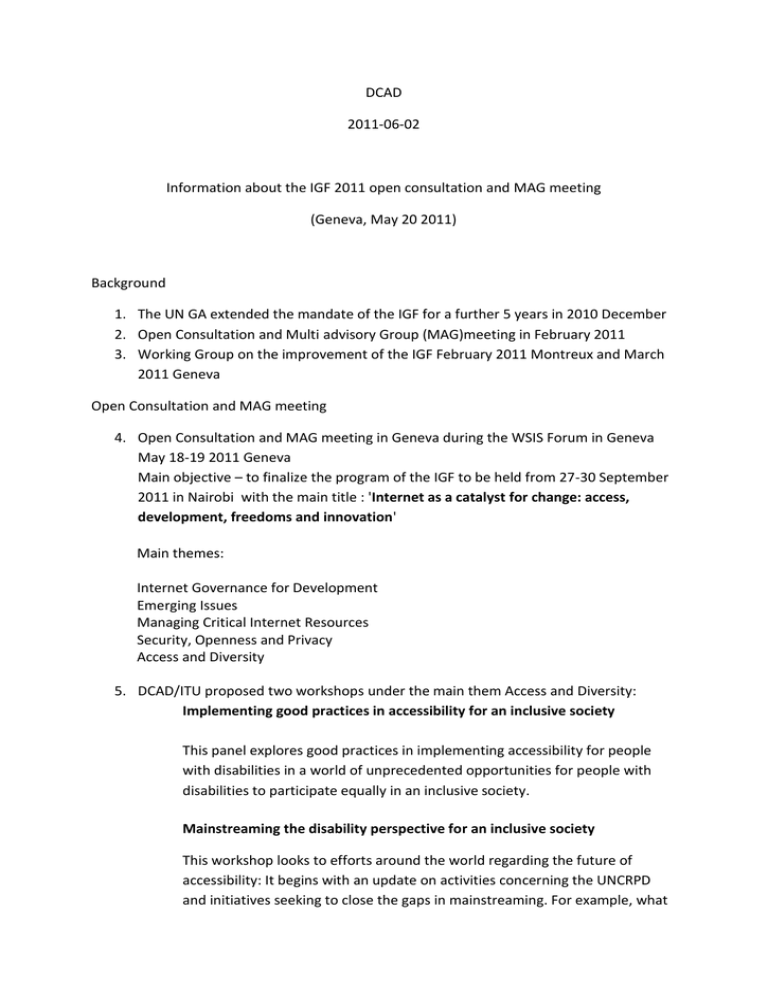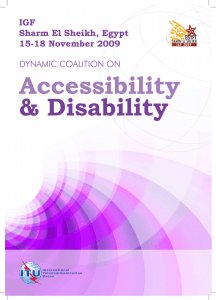DCAD 2011-06-02 Information about the IGF 2011 open consultation and MAG meeting
advertisement

DCAD 2011-06-02 Information about the IGF 2011 open consultation and MAG meeting (Geneva, May 20 2011) Background 1. The UN GA extended the mandate of the IGF for a further 5 years in 2010 December 2. Open Consultation and Multi advisory Group (MAG)meeting in February 2011 3. Working Group on the improvement of the IGF February 2011 Montreux and March 2011 Geneva Open Consultation and MAG meeting 4. Open Consultation and MAG meeting in Geneva during the WSIS Forum in Geneva May 18-19 2011 Geneva Main objective – to finalize the program of the IGF to be held from 27-30 September 2011 in Nairobi with the main title : 'Internet as a catalyst for change: access, development, freedoms and innovation' Main themes: Internet Governance for Development Emerging Issues Managing Critical Internet Resources Security, Openness and Privacy Access and Diversity 5. DCAD/ITU proposed two workshops under the main them Access and Diversity: Implementing good practices in accessibility for an inclusive society This panel explores good practices in implementing accessibility for people with disabilities in a world of unprecedented opportunities for people with disabilities to participate equally in an inclusive society. Mainstreaming the disability perspective for an inclusive society This workshop looks to efforts around the world regarding the future of accessibility: It begins with an update on activities concerning the UNCRPD and initiatives seeking to close the gaps in mainstreaming. For example, what are the gaps in Internet governance? How do we maintain accessibility to information and services when technology and mobile devices are converging to an IP platform? In North America, what gaps in Internet accessibility are being addressed by the new U.S. legislation, the 21st Century Communications and Video Accessibility Act? What is the perspective of a South American on web accessibility laws? Looking to India, what are the challenges for persons with mental disabilities with respect to the Internet? From a global perspective, how does cloud computing play a role in this strategy for accessibility? Relay Services for Persons with hearing and speech difficulties have a place in sustainable development and but what will that look like on the Internet? Accessible Relay services and Broadcasting ( including IPTV) over the internet are being studied in the new ITU Focus Group on Audiovisual Media Accessibility, led by ITU-T, ITU-R and EBU. Finally, what are the UN organizations doing to address the future of accessibility and the disability perspective? Working Group of the MAG decided to merge the two workshops and instead of having two times 90 minutes slots it allocated a 3-hour slot. The reason of merge was that after my explanation members of the group still supported the idea that the two workshops were on the same topic but with different aspects of the topic. Remark: there is no awareness of the problem of accessibility for people with disabilities even among professionals who participated in almost all IGFs (N.B.: in Hyderabad in 2008 we had several workshops, in Sharm el Sheikh we were on one of the main sessions in addition to workshops and we had very successful well attended workshops in Vilnius). During the discussions in the working group of the MAG in the preparation for the Nairobi IGF I could sense however more understanding when I spoke about age-related disabilities. Members of the group agreed that with age they experienced accessibility problems. An administrative problem: all ITU workshops have one focal point Mr. Preetam Malor. The working group had the impression that it is natural to merge workshops having similar topics under ITU logo. 6. Conclusion: As a result of the MAG meeting DCAD/ITU should deliver in Nairobi the merged workshop/panel discussion. We should be careful in conveying our message: - Young people should be involved to raise awareness, accessibility for disabled should be explained that after a certain age it affects everyone. - Tools, standards, legal framework, etc. are for everyone, for an inclusive digital society
